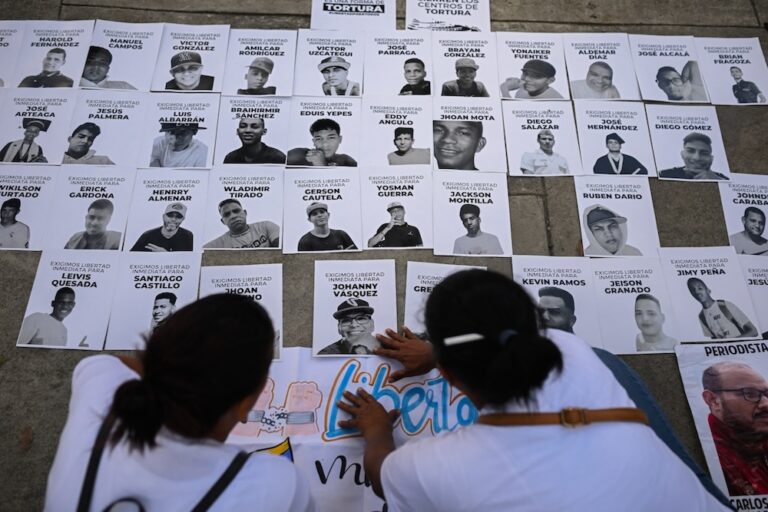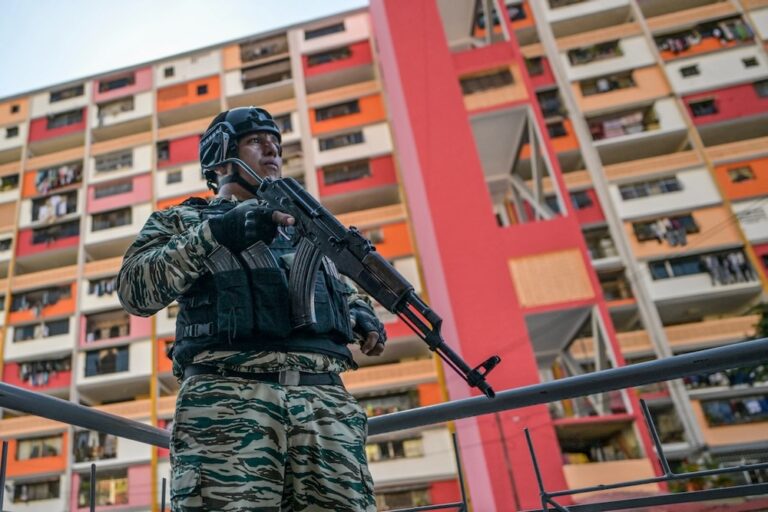(RSF/IFEX) – On 1 August 2007, a “spurious, last-minute legal pretext” was used to force RCTV, now called RCTV Internacional, to suspend broadcasting for the second time in just over two months, RSF said. The grounds cited by the government were that the privately-owned station was not a “national audiovisual producer.” RCTV had resumed broadcasting […]
(RSF/IFEX) – On 1 August 2007, a “spurious, last-minute legal pretext” was used to force RCTV, now called RCTV Internacional, to suspend broadcasting for the second time in just over two months, RSF said. The grounds cited by the government were that the privately-owned station was not a “national audiovisual producer.” RCTV had resumed broadcasting by cable and satellite just two weeks before, after being forced to stop terrestrial broadcasting on 27 May.
“This time, the censorship of RCTV is complete,” the press freedom organisation said. “The Venezuelan government wanted the station to disappear, in Venezuela, at least. First it excluded RCTV from the terrestrial broadcast frequencies. Now it is preventing it from broadcasting by cable and satellite. This second phase of the RCTV affair raises several questions.”
Firstly, if the Radio and TV Social Responsibility Law of 2004 and the regulations of the National Commission for Telecommunications (Conatel) really do require cable and satellite stations – even internationally-structured ones such as RCTV Internacional – to be registered as “national audiovisual producers,” as is the case for terrestrial broadcasters, why was this requirement not previously enforced with all the others?
Secondly, why did the Venezuelan Chamber of Subscription Television remember that the 45 other pay-TV channels should also have to register as “national audiovisual producers” only after it had already given RCTV Internacional five days to do so? And why were the others given 10 days?
Thirdly, why did the communication and information minister wait until RCTV Internacional resumed cable broadcasting on 16 July to announce that the cable and satellite stations would now also have to submit to the system of “cadenas,” in which national broadcasters are required to simultaneously retransmit the president’s speeches and other government messages when they are broadcast by the state media?
Finally, why did the telecommunications minister not respond to the request for a deadline extension for RCTV Internacional that was made on 30 July by Mario Seíjas, the president of the Venezuelan Chamber of Subscription Television?
“The Inter-American institutions have a right to demand explanations from the Venezuelan government and we are waiting for it to provide them,” RSF added.
Venezuela’s oldest privately-owned TV station was ordered to withdraw its programming from satellite and cable TV services at midnight on 1 August – the deadline announced five days earlier by Seíjas. After the renewal of its terrestrial broadcast licence was blocked on 27 May, RCTV had resumed broadcasting on 16 July using the services of three cable operators (Directv, Supercable and Inter) and two satellite operators (Net Uno and Planet).
The day after RCTV resumed cable and satellite broadcasting as RCTV Internacional, information and communication minister Willian Lara announced that the Telecommunications Law of 2000 and the Radio and TV Social Responsibility Law of 2004 would be amended to extend the “cadena” system to cable and satellite. RCTV Internacional chairman Marcel Granier responded that his station should not have to comply because it is an international broadcaster with headquarters in the United States.
Seíjas announced on 26 July that RCTV Internacional, as a station broadcasting in Venezuela, had five days to register as a “national audiovisual producer,” which meant it would have to comply with the government’s system of “cadenas.” If it did not register, it would have to withdraw its programmes from the cable and satellite services on 1 August or otherwise the operators would be subject to financial sanctions.
Reiterating the argument that RCTV Internacional is an international station that broadcasts in other countries (Trinidad and Tobago, and the Netherlands Antilles) as well as Venezuela, Granier pointed out that no other cable or satellite station had been asked to register, and he cited the example of Telesur, a station partly financed by the Venezuelan government, which has been exempted from the “cadena” system on its cable channel.
In response, Seíjas announced that the 45 other cable and satellite broadcasters – for the most part regional broadcasters – would also have to register as “national audiovisual producers,” giving them 10 days instead of the five given to RCTV Internacional.
On 30 July, Seíjas asked telecommunications minister Jesse Chacón to hold urgent negotiations with the cable and satellite stations including RCTV Internacional to “analyse the problem posed by the ‘national audiovisual producer’ status,” suggesting that its criteria were “very outmoded and very subjective” and needed clarification. At the same time, he suggested an extension to RCTV Internacional’s deadline. His request did not get an answer.
RCTV Internacional initially continued to broadcast after the deadline passed but a source told RSF that “broadcasting is going to stop because there is no chance of talks taking place with the government.”
Coincidentally, the Supreme Court has just rejected RCTV Internacional’s final appeals against the government’s refusal to renew its terrestrial broadcasting licence. Two months after the appeals were filed, the court ruled that they were inadmissible because the station had failed to comply with certain “administrative obligations.”


